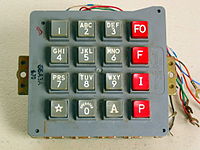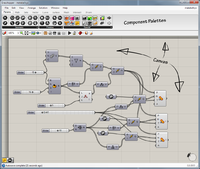
A New List Decoding Algorithm for Short-Length TBCCs With CRC
Sign Up to like & getrecommendations! Published in 2018 at "IEEE Access"
DOI: 10.1109/access.2018.2847348
Abstract: In this paper, a new list decoding algorithm for tail-biting convolutional codes (TBCCs) with a cyclic redundancy check (CRC) is proposed, where the CRC is considered as a concatenated outer code. The main idea of… read more here.
Keywords: new list; decoding algorithm; list decoding; crc ... See more keywords

An Improved SC Flip Decoding Algorithm of Polar Codes Based on Genetic Algorithm
Sign Up to like & getrecommendations! Published in 2020 at "IEEE Access"
DOI: 10.1109/access.2020.3041290
Abstract: Polar codes have been applied for physical downlink control channel in the $5^{\mathrm {th}}$ generation wireless communication system. Although successive cancellation flip (SCF) decoding algorithm can improve decoding performance of polar codes, it has also… read more here.
Keywords: based genetic; genetic algorithm; decoding latency; polar codes ... See more keywords

Rosenthal’s Decoding Algorithm for Certain 1-Dimensional Convolutional Codes
Sign Up to like & getrecommendations! Published in 2019 at "IEEE Transactions on Information Theory"
DOI: 10.1109/tit.2019.2921370
Abstract: The performance of Rosenthal’s decoding algorithm is measured when it is applied to certain family of 1-dimensional MDS convolutional codes. It is shown that the performance of this algorithm depends on the algebraic structure of… read more here.
Keywords: algorithm certain; rosenthal decoding; decoding algorithm; certain dimensional ... See more keywords

An advanced low-complexity decoding algorithm for turbo product codes based on the syndrome
Sign Up to like & getrecommendations! Published in 2020 at "EURASIP Journal on Wireless Communications and Networking"
DOI: 10.1186/s13638-020-01740-2
Abstract: This paper introduces two effective techniques to reduce the decoding complexity of turbo product codes (TPC) that use extended Hamming codes as component codes. We first propose an advanced hard-input soft-output (HISO) decoding algorithm, which… read more here.
Keywords: product codes; turbo product; decoding algorithm; complexity ... See more keywords

Fast decoding algorithm for Gourlay-Young coded apertures.
Sign Up to like & getrecommendations! Published in 2018 at "Applied optics"
DOI: 10.1364/ao.57.008108
Abstract: A fast decoding algorithm is described for the class of flexible coded-aperture designs introduced by Gourlay and Young [Appl. Opt.23, 4111 (1984)APOPAI0003-693510.1364/AO.23.004111]. The algorithm significantly reduces the number of mathematical operations required to perform the… read more here.
Keywords: decoding algorithm; young coded; fast decoding; algorithm gourlay ... See more keywords

A Study of the Effects of Electrode Number and Decoding Algorithm on Online EEG-Based BCI Behavioral Performance
Sign Up to like & getrecommendations! Published in 2018 at "Frontiers in Neuroscience"
DOI: 10.3389/fnins.2018.00227
Abstract: Motor imagery–based brain–computer interface (BCI) using electroencephalography (EEG) has demonstrated promising applications by directly decoding users' movement related mental intention. The selection of control signals, e.g., the channel configuration and decoding algorithm, plays a vital… read more here.
Keywords: number decoding; decoding algorithm; session; performance ... See more keywords

An adaptive acoustoelectric signal decoding algorithm based on Fourier fitting for brain function imaging
Sign Up to like & getrecommendations! Published in 2022 at "Frontiers in Physiology"
DOI: 10.3389/fphys.2022.1054103
Abstract: Acousticelectric brain imaging (ABI), which is based on the acoustoelectric (AE) effect, is a potential brain function imaging method for mapping brain electrical activity with high temporal and spatial resolution. To further enhance the quality… read more here.
Keywords: brain function; brain; signal decoding; decoding algorithm ... See more keywords

Controversial Variable Node Selection-Based Adaptive Belief Propagation Decoding Algorithm Using Bit Flipping Check for JSCC Systems
Sign Up to like & getrecommendations! Published in 2022 at "Entropy"
DOI: 10.3390/e24030427
Abstract: An end-to-end joint source–channel (JSC) encoding matrix and a JSC decoding scheme using the proposed bit flipping check (BFC) algorithm and controversial variable node selection-based adaptive belief propagation (CVNS-ABP) decoding algorithm are presented to improve… read more here.
Keywords: abp algorithm; algorithm; source; decoding algorithm ... See more keywords

Improving Decodability of Polar Codes by Adding Noise
Sign Up to like & getrecommendations! Published in 2022 at "Symmetry"
DOI: 10.3390/sym14061156
Abstract: This paper presents an online perturbed and directed neural-evolutionary (Online-PDNE) decoding algorithm for polar codes, in which the perturbation noise and online directed neuro-evolutionary noise sequences are sequentially added to the received sequence for re-decoding… read more here.
Keywords: polar codes; noise; pdne decoding; improving decodability ... See more keywords